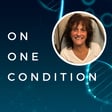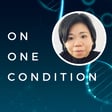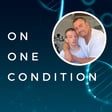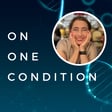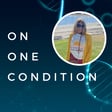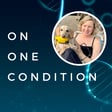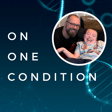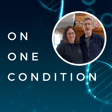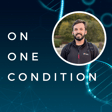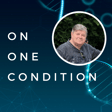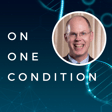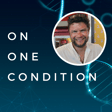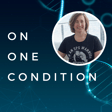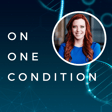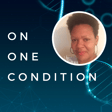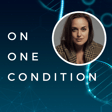Become a Creator today!Start creating today - Share your story with the world!
Start for free
00:00:00
00:00:01

Episode 36: Dionne Stalling - PI & CIDP
In this 2-part series with Dionne Stalling, we focus on four of the nine conditions that affect her.
In part 1, we talk about primary immunodeficiency and chronic inflammatory demyelinating polyneuropathy. In Dionne's case, both conditions are linked and she shares how. Dionne is a single mum who has had to juggle with a lot of doctor's appointments whilst raising her two children. She opens up about the toll living with rare diseases has had on her family. We also talk about patient advocacy and the organization she created, Rare and Black.
The first song Dionne selected is Heaven Knows by Lalah Hathaway.
Transcript
Introduction to 'On One Condition'
00:00:00
Speaker
Hi, I'm Sylvain Bertolo, and you're listening to On One Condition, a podcast to raise awareness about health conditions by listening to people who leave them every day.
Introducing Dion Stirling
00:00:10
Speaker
Today, my guest is Dion Stirling, and we're going to talk about three conditions, immune deficiency, short bowel syndrome, and chronic inflammatory demilinating polyneuropathic.
Dion's Motivation and Favorite Song
00:00:25
Speaker
Hi, Dion. Thank you for joining me. How are you doing?
00:00:28
Speaker
I'm good, Sylvan. Thank you for having me. So as you know, I like starting with the song. So could you share with us which song you chose and why, please? My song is Heaven Knows by Layla Hathaway. It is my one of my favorite, favorite songs. Whenever I have been really depressed or down, I can turn it on. And within the first 15 seconds of the song, I feel so much better.
00:00:58
Speaker
I love when music does that. Why is this song specifically? I don't know. I guess because I love music and I was in the band in high school, elementary, middle and high school and the instruments in the song are excellent. And then when her vocals come, it just makes me happy. A really good dancing song.
00:01:29
Speaker
Nice. And she's got such an amazing voice and she can do things like incredible things with her voice. So I fully approve. Not that you need my approval, but anyway.
Journey with Primary Immune Deficiency
00:01:42
Speaker
I know you have nine different conditions, but today we decided to focus on three that if I'm not wrong kind of go together and make sense to talk about together. So I'll ask you a very broad question and essentially where should we start considering those three different conditions? We could start with primary immune deficiency since that's the big
00:02:12
Speaker
overlapping condition. I was born with common variegal immune deficiency and subclass IgG deficiency, but I didn't get diagnosed until I was 45 years old.
00:02:27
Speaker
And because of my late diagnosis and my long medical odyssey, it caused me to have the other two that we're going to talk about, the short bowel syndrome and the CIDP. The reason that my health is the way that it is is because I didn't get diagnosed earlier in my life.
00:02:50
Speaker
And so having PI all of my life, I always had some sort of infection for as long as I can remember.
Misdiagnosis and Chronic Infections
00:02:58
Speaker
And because of those infections, of course, the course of treatment would be antibiotics. And so I would finish the antibiotics and sometimes it will help, but more times than not, it didn't. Or antibiotics didn't help me. Sinus infections, infections with wounds,
00:03:19
Speaker
just various infections that never have never healed. And I was always brushed off as, you know, just being chronic but not knowing exactly why. And also being told by doctors that I wasn't finishing my antibiotics or I wasn't taking them as prescribed, which was totally untrue.
00:03:39
Speaker
Okay, well, do you know why it took so long to get the diagnosis or the right diagnosis?
Complications from Hysterectomy
00:03:46
Speaker
Okay, so let me tell you the story up until diagnosis, a brief synopsis. I had a hysterectomy in 2008 that
00:03:57
Speaker
went awry, that hysterectomy during that surgery, my surgeon nicked an artery and we didn't know it. And so I hemorrhaged for two days. And when they went back to repair the hemorrhage, that wound ended up getting infected.
00:04:17
Speaker
Probably from the time that that hospital stay up until for six months. I was in and out of the hospital Probably
Finding the Right Surgeon
00:04:25
Speaker
four months out of the six in total I would come go in the hospital for two weeks come out for a week have to go back in
00:04:33
Speaker
And the physician that I was seeing refused to open me back up. And surgeons typically don't go behind other surgeons. If there's a complication, the doctors will tell you to go back to the original surgeon. But my doctor wouldn't open me back up because he had been my doctor for a long time, and he knew my history with infections. And he was like, you know, you take a while to heal, which I do.
00:05:01
Speaker
he said basically that he wasn't going to open me back up and so a series of events followed. He ended up referring me to another physician out of frustration and the physician that he referred me to said I don't know why he would send you to me because I don't handle what you need but you have a bio duct that's blocked
00:05:27
Speaker
that you need to get taken care of as soon as possible. And if you don't, you're going to die. And so I went home and I got on the computer and I looked for the richest suburb in St. Louis, which is where I live. And I found the zip code and there's one hospital in that zip code. And I went on that hospital's website and I looked for the chief of surgery. I called his office.
00:05:57
Speaker
The woman said, I explained to her what my issue was, and she said, he doesn't handle that type of surgery, but we have a surgeon that does. And so I made an appointment with that surgeon. We talked. I gave him my medical records because I'm one of those people that print out my medical records that's in the portal. And I also go to medical records in the hospital. So I had given him my medical records.
00:06:24
Speaker
And we operated or he operated on me, but when he came out of, when I came out of surgery and recovery, he said, I wasn't able to do
Diagnosis After Vaccine Challenge
00:06:34
Speaker
the surgery. And so I was like, well, I don't understand because I know you cut me because I can, you know, if you could, the bandages were there. And he said, you have an infection.
00:06:46
Speaker
And if I had done this surgery, you would have probably been sepsis. Um, and he ended up referring me to a infectious disease doctor and that infectious disease doctor treated me off and on for maybe five or six years.
00:07:04
Speaker
And it was then with him being frustrated by me being infected or having a wound that wouldn't close all that time, he said, let's see, have you had an HIV or an AIDS test? And I was like, not recently. And so he said, let's see if you have that. And so we did the test and I didn't. So he said, I don't know what to do. And I'm going to refer you to an immunologist. And so I saw an immunologist and I spent seven minutes with her.
00:07:34
Speaker
And she did what they call a vaccine challenge. And when we got the results from the vaccine challenge, I was diagnosed with primary immune deficiency, something that I had been born with.
Impact of PI Diagnosis
00:07:50
Speaker
I was 45 years old at that time. So that's how I got that diagnosis, which made a lot of sense because
00:07:57
Speaker
people with PI that they don't have, part of their immune system is missing or the immune system that they have doesn't work. And so mine was the latter.
00:08:09
Speaker
Oh, yeah. So it wasn't completely missing, which makes sense. Then it was not obvious, I guess. It sounds like you had a few months of first very difficult navigation through the healthcare system, but then all that time you were still, you needed a procedure to be done. So that must have been
Awareness and Training in Healthcare
00:08:35
Speaker
challenging.
00:08:36
Speaker
Yeah, it was. It is challenging because, you know, some things sometimes the medical professionals feel like maybe normal or they're not curious enough to figure out some things because PI is a rare condition. So it's not something that
00:08:57
Speaker
historically has been talked about in depth in medical school. So it would make sense that if they weren't trained, like an immunologist is trained to figure this out, then a regular primary care physician or an internist wouldn't necessarily know about it unless they know someone or they've seen something in their training that would make them think that.
Improvement with Immunoglobulin Therapy
00:09:23
Speaker
I see, I see. And has it been easier to get the right treatments in case of infection now you've been diagnosed or not? Well, what I do is I take weekly immunoglobulin therapy, which is made up of blood plasma.
00:09:41
Speaker
And the antibodies and the blood plasma gives me what I need to be better, not necessarily to give me a complete working immune system. It helps, it's cut down on my infections tremendously. It makes life a lot better. I still walk around, I've been wearing masks well before COVID, so I still do those things at most times where
00:10:07
Speaker
people with PI, a small infection can make you ill, put you in the hospital, or even be fatal.
Living with Multiple Chronic Conditions
00:10:15
Speaker
So I've been lucky that I don't have as many infections as I used to. That must be life changing, I guess.
00:10:23
Speaker
It actually very much so, but it makes it a lot better because now I know that it's a thing. Like when I got diagnosed, it was jarring because for years I was told, you know, certain things about the infections I have. Like I wasn't bathing or
00:10:45
Speaker
that it was sometimes psychosomatic or I wasn't being compliant with taking the medicines or things like that. So when I got a diagnosis and it was actually a thing, like a name, a condition, a treatment, a physician that could treat that, then it made a whole lot
00:11:07
Speaker
It made it realistic to me where I didn't feel like I was going crazy because you know sometimes I had also been told a few times that I needed a site consult which really didn't make sense when there is an actual physical infection going on.
CIDP and Nerve Damage
00:11:24
Speaker
And how is this then linked to the two other conditions? Well, CIDP is a condition that is brought on by a severe infection. And so I had Staph and MRSA at the very same time, right before my PI diagnosis. It almost killed me.
00:11:48
Speaker
for a couple of months, I couldn't walk at all. It just felt like my lower half was not operable at all. It felt like a truck was literally laying on my legs, my feet would tangle. But the polyneuropathy
00:12:05
Speaker
It makes you feel like there are needles on the bottoms of your feet and your legs. For me, from the knee down, even now, it is very painful. I'm in pain every day. That's the CIDP, but the odd thing is that
00:12:26
Speaker
At the time, the insurance company wouldn't pay for the treatment, which the only treatment that's for long term is the immunoglobulin therapy, which I take for the PI. So they both go together, but I was told because of the staff at Mercer and because I had it for such a long time and I didn't present like I had, um,
00:12:51
Speaker
Staph infection because I don't get temperatures. My body temperature sometimes is normal at around 97.6. So I didn't spike in temperatures like a lot of people do. You know, when you get a cold, they all tell you cold or sniffles and fever. I don't, I've got a fever for the first time.
00:13:12
Speaker
in about 15 years in 2019. And I was so happy when I got it, I was in the hospital and she was like, oh, you're up to 101. I was like, oh my God, really? And she was saying, you happy about this? I said, yes, because I've been really, really ill and I don't get temperature. So for me to have- So is that link to PI then?
00:13:38
Speaker
It is. A lot of PI patients don't get fevers. There has not been enough research around the condition to know why that is, but I know that with my volunteer work and my advocacy work with patients that I've had a chance to talk to, that's like a norm for us.
00:14:07
Speaker
Okay and so what does CIDP do to your body? It damages the nerves and so it also creates weakness and I thank God that I didn't have issues with my arms for the most part but it it causes damage to your nerves and when you have nerve damage that's
00:14:34
Speaker
permanent.
Chronic Pain and Mental Health
00:14:35
Speaker
It's nothing that can be, it's not that you can regenerate the nerves. I've been told, I don't know how true it is, that you can do certain things to make it better. But I think I've tried everything under the sun and nothing has worked for me. So yeah, there's no, and I don't have a lot of muscle weakness anymore. This was a
00:14:59
Speaker
A short time for me, I know people that have dealt with some sort of paralyzed type symptoms, but that wasn't me. It was just maybe two or three months that I wasn't able to walk. And if I did, it was literally from the bed to the bathroom. And then even that was an issue.
00:15:20
Speaker
Was this due to the muscle weakness or was it more of a nerve issue? Yeah, the muscle weakness was the issue then. The nerve damage just causes excruciating pain. It just either it feels like someone is sticking you with needles or it feels like you're walking on fire.
00:15:42
Speaker
Wow. I've heard from people who have chronic pain. It's very difficult to manage and can actually really have an impact on your mental health. Is it true for you as well? Yes, yes. The mental piece, it makes me really anxious and hyper-focused.
00:16:05
Speaker
I have a name for something else that I deal with, which is persistent postural, perceptive dizziness, which is anxiety induced. It's a rare condition too, but there is no treatment for it. It can be managed by vestibular physical therapy and cognitive behavioral therapy. So I go to therapy for that. The mental piece, especially for me, because I'm a single mom, and at the time, right after my hysterectomy,
00:16:34
Speaker
both of my children were living at home. And so it was really hard because I still had to mother, but I also was dealing with life altering events and also being in and out of the hospital so much was taking a toll on my children.
00:16:54
Speaker
I have a son that hates hospitals, and I think I can count on the times on one hand that he came to visit me. Now, he would call every day, but he didn't like to visit. Trying to navigate illnesses.
00:17:10
Speaker
as well as being a parent because you can't really crumble in front of your children. So become hyper focused on certain things. And so it gave me a lot of anxiety and it still does. I get really hyper focused on certain things. And I also know that depression
00:17:32
Speaker
sometimes mask itself as anger. It doesn't, you know, it's not necessarily the, oh, I can't get out of bed. It also is people that are easily irritated, which I tend to do. I have to work really hard on not blowing a fuse.
00:17:50
Speaker
All the time and it's i'm a work in progress but it's been a very long journey so and also things that you think that are normal that people are like no dion you know that's that's not normal like you should like it's okay to break down and i'm not that's not my temperament and that's not usually what i do but
00:18:14
Speaker
There are layers upon layers of anxiety and depression that mask itself as other things that we as a society think that it should look like.
Balancing Parenthood and Illness
00:18:28
Speaker
It's different for everyone. I'm trying to figure out now what makes me happy, like what brings me joy.
00:18:36
Speaker
you know, relearning things that I used to like when I was a kid, like puzzles and flying kites and things like that. I'm trying to learn how to do that in my 50s as an empty nester. That's nice. What is the drive to look back at what made you happy when you were a child?
00:19:01
Speaker
because I had a really good childhood. I have more years behind me than I do in front of me unless I live to be 110. And so just trying to find joy in the small things, I'm looking forward to my children's continuing to excel. And I'm also looking forward to grandchildren. So when I want to be able to be physically and mentally fit,
00:19:28
Speaker
to be able to enjoy them and enjoy myself. It's something totally different when you have spent the bulk of your adult life parenting, which I have. My adult life, I had been a parent. And so it's different when you don't have to do the day-to-day
00:19:51
Speaker
you know, trying to figure out what kid is going to what activity or who has a doctor's appointment, things like that on top of having lifelong illnesses. The drive is really being able to find out who I am outside of my illnesses, do something fun.
00:20:17
Speaker
Yeah, and you're raising a topic that we could talk about for hours, I guess, but it's very difficult to look after yourself when you know that you need to look after others as well, but to address
00:20:35
Speaker
mental health struggles, you really need to look after yourself and not put yourself under more pressure, which as a single parent, I can imagine is not possible.
Mental Health Support Gaps
00:20:50
Speaker
Right, right. Because you don't want
00:20:54
Speaker
which ends up happening anyway, right? You don't want your children to have anxiety around you as a parent or so you think, but knowing even if they see you, they're still experiencing that anyway. Like there's nothing that you can do, shield them from it if you all are around each other, which has happened with both of my children. So they handle it totally different.
00:21:23
Speaker
even though I tried to shield them and put on a brave face and, oh, it's not that bad. I just have to go back in the hospital for a few days. And, you know, one thinks that the hospital is a fun place to be, and then the other one doesn't want to go near it. And you, as a parent, not realizing until you get out of that situation how the whole thing has impacted.
00:21:48
Speaker
your families and that goes for any person dealing with any illnesses. It's just not, you are the patient, but it's not just happening to you. It's happening to your whole support system. Yeah, yeah, yeah. I get that. And did you get any support at all from the healthcare system, from your insurance?
00:22:10
Speaker
Yes, I have the luxury of not having astronomical medical bills like so many people that I know. What I do feel that it was lacking was mental health support. I'm not really into support groups. I tried it twice. That's not my thing. But when you have rare conditions,
00:22:33
Speaker
Sometimes depending on the condition, there is no one that you can bounce off ideas off of and say, hey, did this happen to you? Because there's not anything or a place that you can find people, right? Other than maybe a Facebook or something like that. I'm one of those people because so many things have happened to me that has not happened to other people.
00:22:58
Speaker
I don't like to really get into groups. You know, it works for purposes, but what I found is how my situation may be totally different because everybody's body is different, right? And so if you tell someone, are you experiencing this? And they're like, no, maybe you should try this, but why would you tell me to try this and you haven't experienced it? You know, so I don't
00:23:22
Speaker
do like a lot of online things. But that was back in 2014 when I got diagnosed. And things have changed a lot for the better. There's more advocacy, more support from pharmaceutical companies and advocacy organizations that really their ultimate goal is to create community around certain conditions.
00:23:52
Speaker
And I just wanted to raise a comment that I think is so dated now in a way in our healthcare systems that there is no mental health support. The fact that you've had so many, that you still have so many different conditions, but it sounds like you still have to fight very hard to get the right treatment for yourself.
00:24:20
Speaker
Yeah. Well, that only requires so much strength, but then I don't get how there's no mental health support provided to patients with rare conditions. Well, here's the thing in the United States. If you are on Medicare,
00:24:43
Speaker
Medicare will not pay for you to see a therapist. That's supposed to change, I think, and it may be this year or 2025. I know the law changed. I can't, don't quote me because I don't remember, but I know that that's changed. But if you are on Medicare for
00:25:04
Speaker
being disabled, not Medicare for retirement. There is a reason why you're on it, that you've been deemed disabled and not able to work. And that does a lot to the psyche if you're 30 years old, if you're 45 years old, and all you've done in your whole life is work. I don't understand why mental health is not
00:25:27
Speaker
And just like I was telling you about the persistent posture of perceptive dizziness, that is a, it's a vestibular disorder that's anxiety induced. However, it costs a lot to manage it, which is also, the management is covered as far as the vestibular physical therapy, but the mental piece, which you also need because they need to work hand in hand,
00:25:56
Speaker
it would cut costs all the way around if we could do that. And I don't know how we can make lawmakers understand that. Also, sometimes with insurance, private pay insurance, people may have a mental health coverage, but it doesn't cover
00:26:16
Speaker
long term, you know, you may get 20 visits or 30 visits to see someone. Well, what if a whole year or two years or whatever you're going through, just say if you are a caregiver to a wife with cancer and her cancer journey is two and a half years.
00:26:36
Speaker
You still need some type of outlet, whether it be talking to a therapist or being able to do some exercises or something.
Advocacy Through 'Rare and Black'
00:26:48
Speaker
And so the outcome would be a lot better if the payer portion was covered.
00:26:55
Speaker
Yeah, completely agree. It sounds like there's a need for much more advocacy to not only within the clinical industry or pharmaceutical industry, but also with insurance companies. Talking about advocacy, so you started rare and black. Would you like to share why you decided to start it?
00:27:20
Speaker
Sure, I started rare and black. After a few years of me volunteering for an organization, I would be asked to speak somewhere and I was the only person of color in the room. And if I wasn't the only person of color, I was surely the only black woman because I've always been curious by nature and I love learning. I was always
00:27:49
Speaker
struck by things that I heard that I was convinced that other black people hadn't heard. It was an education piece. And so us not knowing why things were the way that they were. And so when I had the inkling to create an organization, I was trying to figure out
00:28:11
Speaker
I don't want to reinvent the wheel. I don't want to concentrate on sickle cell. I don't want to concentrate on immune deficiency. I want to be able to be a bridge.
00:28:22
Speaker
from one organization to the patient and do that. And so what I've done is, Rare and Black, we do a lot of policy work. We also do a lot of education where I think it's lacking or because someone has brought something to our attention.
00:28:47
Speaker
And so it's a nonprofit organization whose mission is to amplify the voices and experiences of black people living with rare conditions through advocacy, education, and support. More so on the advocacy and education. I can't do a lot of monetary support because of funding, but we do pretty well with connecting patients to organizations or physicians to be able to get the proper care.
00:29:15
Speaker
or trying to refer them to someone that can help them do something financially. Okay, so it's not just about advocating, then it's also providing support to the patients directly. That's great. How long have you been in existence with Rare and Black? Our anniversary was on March the 12th. In 2020, we were founded. So it's been four years.
00:29:40
Speaker
Wow. Has it been growing over the past four years? Have you had a lot of involvement with what you, have you reached goals that you were hoping to reach? Yes. We had our first patient and scientific engagement summit last year. It's going to be every other year in April. April is minority health month. So I'm happy to say we, there was a two day event and the idea
00:30:08
Speaker
was to have physicians and healthcare workers and patients in the same place to learn from each other. I'm happy to say that Summit got a few people diagnosed from a couple of the panels that they heard. And then also we had a panel around transitioning from a pediatric medicine to adulthood. I've had a lot of
00:30:35
Speaker
positive feedback from that panel because that's a huge thing in the rare disease space to children that don't get the enclosure of multidisciplinary treatment in adult medicine like they do in pediatric care. So that's really good. When I created that event, I didn't think that we would have
00:31:01
Speaker
anybody diagnosed. The whole premise was just to educate. The diagnosis on top of that was just the icing on a cake. It was really fulfilling.
00:31:13
Speaker
to know that people got answers from things that they thought were normal and they actually were illnesses. Yeah, it's interesting because it sounds like you're breaching a gap in a way because I hear a lot about patient advocacy groups that focus on advocating.
00:31:33
Speaker
raising awareness, and also on the other end, organizations that support clinical trials and focusing on specific conditions. But here you seem to have both the education and advocacy, but also practical meetups, which sounds very good.
00:31:57
Speaker
Yeah, it's really important. Because a lot of, if we could change some of the policies, it would help so much, right? And it's policies around trials, how trials are done, the funding for them.
00:32:14
Speaker
It's also policies around insurance and what needs to happen to get a diagnosis. Newborn screening is extremely important to me because I think that ties into infant mortality, children that die from SIDS. Babies don't just go to sleep and pass away in their sleep for no reason. There is a reason behind that.
00:32:42
Speaker
knowing what's wrong with children and if we can get diagnosed young. Like if I was diagnosed, even though there is no newborn screen for what I have, if I was diagnosed at five or six when I first started going to school and the infections were more because I was around more children.
00:33:02
Speaker
then my life as a 45-year-old woman would have been totally different. And now in my 50s, you know, seeing what that looks like and also what's also extremely important to me is geriatric care because in your 50s they consider you geriatric but there is a lot of advocacy around
00:33:25
Speaker
infants and children, which there is nothing wrong with that, right? But your life is not over when you turn 18. And the needs of an 18 year old is different than the needs of a 55 year old with rare conditions. We have to recognize it, but also figure out
00:33:45
Speaker
how can we best support people that are aging, still have fulfilling and enriching lives to be able to have the best optimal healthcare outcomes.
Conclusion and Future Discussions
00:34:00
Speaker
Yeah, we've got still plenty to talk about. I'm glad that we have more opportunity to talk together because you've just mentioned two or three different topics that I really want to get into next time we talk. But I think for today, that's going to be my last question, which I love asking everyone who comes on the podcast. What's your happy place, a place where you feel at peace?
00:34:31
Speaker
Although I don't live near one, a beach with really blue water is my happy place. So even if I can't get there, I'm one of those people that will go online just to look at beaches. And does it help you relax straight away then? It does, absolutely. The sound of water helps me tremendously.
00:34:55
Speaker
And I've downloaded an app that I pay for just to listen to sounds of water.
00:35:02
Speaker
Ah, that's nice. I didn't know that exists, but yeah, that's amazing. Yeah. Well, Dion, thank you so much for your time today. For those who are interested in listening more about the topics that Dion mentioned at the end around changing policies, minorities, representation and so on. I think we're going to talk more about that next time we meet.
00:35:29
Speaker
But for now, thank you very much, and I look forward to our next discussion. Me too. I'm excited.
